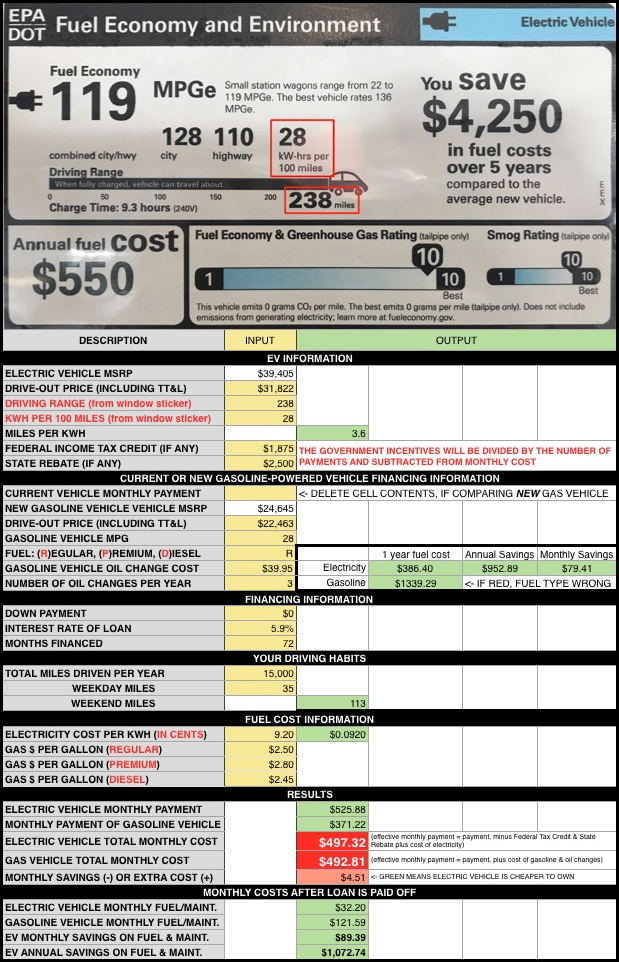These three numbers are all you need to make your decision:
- Electric range your PHEV gains, per hour of charging
- Cost of one gallon of gasoline
- Cost of using the public charger per hour
Use those numbers this way:
Miles gained per hour of charging X cost of gasoline ÷ 1 hour charge cost = MPG equivalent (or MPGe)*.
*It has been pointed out to me that the industry definition of MPGe is different than what I am stating here. However, I have been unable to formulate a way to say, “It’s like you’re driving a vehicle that gets xx miles per gallon,” in a succinct manner.
***IF YOU JUST WANT A SINGLE NUMBER TO CARRY AROUND IN YOUR HEAD, JUMP TO THE “ONE LAST THING” SECTION, AT THE END OF THIS POST.***
How this works (if you care):
I have made my living with math and geometry for almost my entire career. I was a CNC machine operator and programmer, manufacturing engineer and CAD designer/consultant/programmer. Except for my foray into retail sales (Apple and Chevrolet), I have used algebra, geometry and trigonometry extensively and really enjoy applying these tools to make decisions.
I understand that not everyone enjoys math like I do. Perhaps most people don’t. But there are times when it can be valuable, as in day-to-day financial decisions, and useful to many if it is easy to apply. One example that comes up often, for those who drive plug-in hybrid vehicles, is deciding on using public charging infrastructure. For this discussion, I am only addressing financial considerations, NOT ethical or ecological considerations.
The math involved is quite simple, as long as you know a few things about your vehicle and gasoline, such as:
Electric range gained per hour of charging: You probably know this number by heart, but haven’t thought of it this way. My 2017 Chevy Volt takes about 4.5 hours to completely fill the drive battery, from empty to full (on a Level 2 charger). The EPA estimates that I get an average of 53 miles on a full charge. So the EV range I gain, per hour of charging, is simply:
53 miles ÷ 4.5 hours of charging = 11.78 miles of range, per hour of charging.
Cost of one gallon of gasoline: The average for a gallon of regular gasoline, in the U.S. last month, was $2.86 (according to GasBuddy.com).
Cost of using the public charger per hour: If the charger is free to use, STOP RIGHT HERE AND PLUG IN! After all, free electricity is free electricity. If the charger has a cost associated with its use, it is probably stated in an hourly rate. Just make note of that price.
If the charge cost is stated in cost per minute, don’t fret! It’s an easy conversion: A recent Facebook post I read, mentioned charging at a specific Blink charger cost the user $1.50 for 25 minutes of use. To convert this information into the rate per hour:
Cost for the time spent charging X 60 (minutes in an hour) ÷ 25 (actual time spent charging in minutes).
$1.50 X 60 ÷ 25 = $3.60
These three numbers are all you need to make your decision! In summary, they are:
- Electric range gained per hour of charging: 11.78
- Cost of one gallon of gasoline: $2.86
- Cost of using the public charger per hour: $3.60
Use those numbers this way:
Miles gained per hour of charging X cost of gasoline ÷ 1 hour charge cost = MPG equivalent (or MPGe)*.
11.78 X $2.86 ÷ $3.60 = 9.36 MPGe*.
Since my Volt gets 43 MPG, when running the gas engine and charging at that specific Blink charger gets me the equivalent of 9.36 MPG, it is better for me financially to skip this charger and drive on gasoline.
*It has been pointed out to me that the industry definition of MPGe is different than what I am stating here. However, I have been unable to formulate a way to say, “It’s like you’re driving a vehicle that gets xx miles per gallon,” in a succinct manner.
ONE LAST THING:
If you just want to know the hourly price for charging, that would have you at a break-even point, when compared to running your PHEV on gasoline, it’s an easy number you can just memorize. It’s based on the same math we’ve been doing, up to this point:
Miles gained per hour of charging X cost of gasoline ÷ Your PHEV’s MPG (when running on gasoline) = Break even charging price (per hour).
Using my 2017 Volt numbers for its charging speed, the price of gas and its MPG on gasoline, it works like this:
11.78 X $2.86 ÷ 43 = $0.78
Now, all I have to remember is that if the price to charge at a public charger is 78¢ or less, per hour, I’ll save money by charging there. If higher than 78¢, per hour, I might as well run on gasoline.
This is easy to remember and since gas prices, your PHEV’s MPG on gasoline and miles added per hour of charge don’t usually vary much, you have no equation to remember!
#MEVJ #EV #texasEV




Great. Love your formula. I’ll be using it on my next road trip in my Volt.
I updated the post to include the break-even point, so you don’t have to remember the formula.